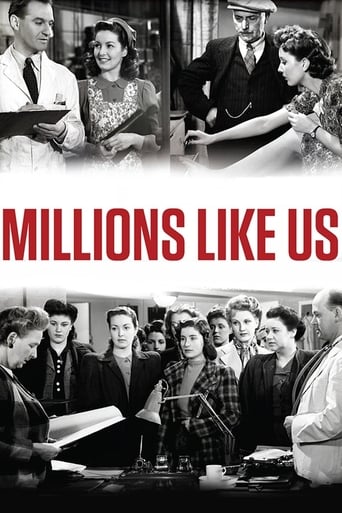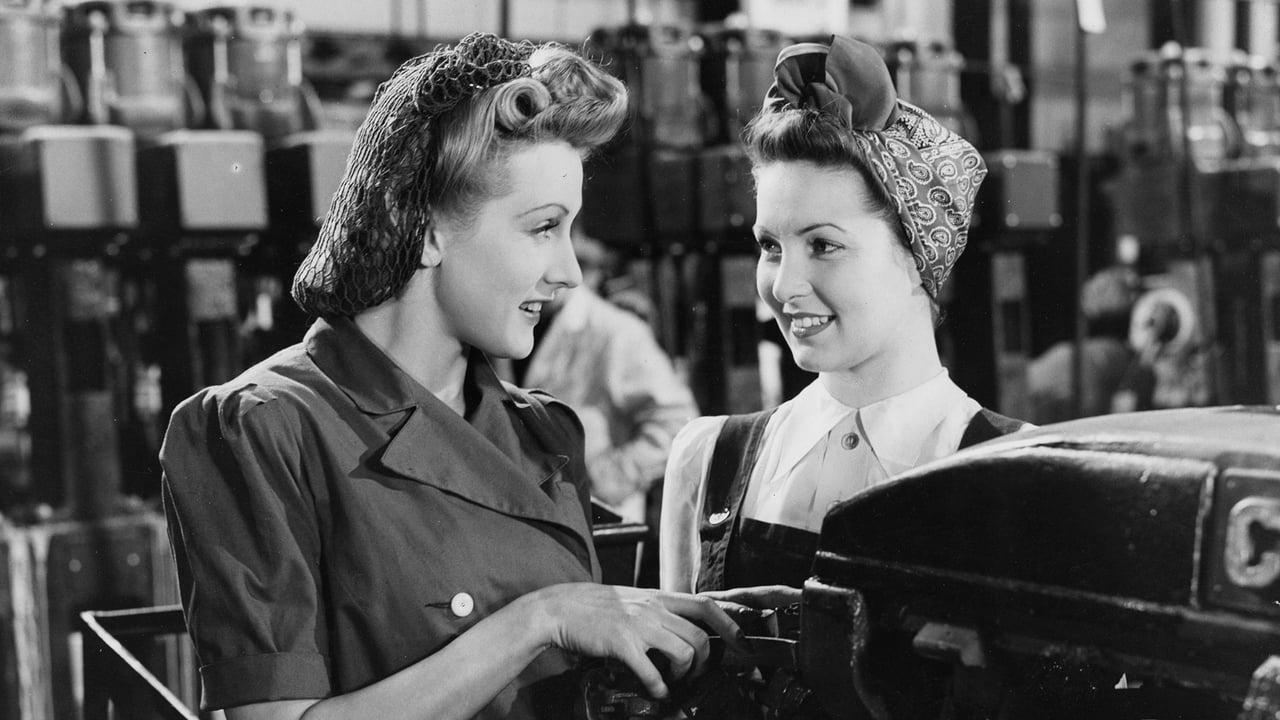ady123
This is one of those old wartime movies that sucks you in with reasonable casting and a nice script, all coming together to give you a very pleasant viewing experience. There are no heroes, it's all about ordinary folk who are caught up in extraordinary times, and the film projects this theme well from start to finish.Gordon Jackson looked young enough in Whisky Galore but in this one he's almost cherubic.There's no teeth grinding patronising propaganda, this film went straight for the jugular and basically told audiences that in the interests of survival we all have to get the heck on with it, a message suitably softened by a nice human interest script, the characters are genuinely different and interesting.If you get the chance, this is definitely one to sit back with, relax and enjoy.
dodochris
I almost skipped this movie because I thought it was a documentary. It turned out to be a heartwarming and heartbreaking gem. My parents were kids living in Manhattan when the War broke out and my father turned 18 in 1944 and joined the Navy, telling us that he couldn't wait to get in it. They grew up in a neighborhood where everyone they knew signed up as soon as they became of age. The sacrifices that were given in order to support "our boys over there," rations, no meat and sugar, the joining of the various clubs and church organizations that sprung up to do "their share" were all very much the stories that I grew up hearing; all told without malice, but with a true sense of wanting to help, and proud to do it. "Bundles for Britain" was a saying I first heard from my father-in-law who spent 3 years in Africa with the Army. Seeing this movie gave me a genuine look (as it was filmed in 1943) of what exactly our Greatest Ally was enduring. While the ending was heartbreaking, it expressed, through a young woman's eyes, how the War effected everyone in different ways and how they changed from the beginning, middle and an end which was yet to be seen. A man I worked with told me, "I cannot describe to you the feelings of patriotism that swept through the country during the War." This movie showed the ultimate sacrifices, both willing and non-willing, that were made, and how "carrying on" is an expression that means just as much now as it did then and will serve in every aspect of our lives.
Oct
Some of Britain's best Second World War films had equivocal origins as 'suggestions' from the Ministry of Information (i.e. propaganda) under its mischievous and mysterious chief, Brendan Bracken. 'The 49th Parallel', 'The Life and Death of Colonel Blimp' and 'A Matter of Life and Death', Powell's and Pressburger's productions, were all begotten by a Whitehall daddy whose name was kept off the birth certificate.Ditto 'Millions Like Us' by another talented duo. Launder and Gilliat, well established as scriptwriters, ventured into feature direction (the only time they took a joint credit) with this episodic and fascinating study of life on the home front.It centres on the long, dull hiatus between the Blitz and invasion scares of 1940 and the forthcoming relief of D-Day in 1944. The propaganda purpose was to rededicate civilians who were becoming bored with the seeming stalemate: Hitler no longer menacing us, we not yet able to take the war to his camp. Women were targeted for morale-boosting. The film aimed to convince these 'millions' that their conscription into factories, often seen as unglamorous by comparison with uniformed service alongside the fighting men, was essential for victory.Thus Patricia Roc, the shy home-keeping daughter of a domineering working class widower, dreams amusingly of heroics as a nurse or airwoman, and dreads being called up for industrial work on a production line in a strange town. But she makes friends, is good at her work, marries a nice flight-sergeant in the Royal Air Force and endures the vicissitudes that follow. Other girls from widely different social backgrounds muck in and do likewise.So much for the uplift. Rarely has a pill been so deftly sugared, however. The scene-setting in the widower's house is an index of the film's almost obsessive determination to avoid overt uplift.Rumours of war on the wireless are exchanged for dance music on the other channel. Patriotism does not visibly improve among the younger generation once hostilities begin. One daughter is man-mad, entertaining the troops not wisely but too well; another whose husband is serving in the Western Desert is a lazy, grumbling, neglectful mother. The old dad (Moore Marriott, gruff and unrecognisable as the antic dotard of the Will Hay classics) does his bit in the Home Guard but moans inconsolably about being 'deserted' by his daughters when the country whisks them away.At the factory a socialite drafted to turn a lathe strikes up an uneasy friendship with her gruff northern supervisor; but he tells her she'll never be better than mediocre at the work, that she might not be good enough for his proletarian family and that he isn't ready to propose to her because they may be too different. "Ooh aye, ooh aye" she mockingly replies. This brilliantly crisp little exchange seems in retrospect to predict the bombshell Labour victory of 1945, when the people of the 'People's War' gave the upper crust its quittance and the rising technocratic class took control.Laced with verite footage of crowds at play at the seaside or entering and leaving factories, the film plays like a fictionalised version of Humphrey Jennings's 'Spare Time' and 'Listen to Britain'-- with perhaps a conscious homage in the canteen community singing of the moving final episode. And through it runs the music of Beethoven, as if to acknowledge that the enemy has his good points: here it anticipates another Jennings classic, 'A Diary for Timothy'.The acting, especially in the home sequences, is low-key in the same manner as Lean's 'This Happy Breed'. A far cry from the stagey histrionics of pre-war British cinema, it anticipates the naturalism of TV drama. There are no big speeches or characters, just commonplace folk muddling through. The interpolation of Naunton and Wayne, whom L&G had made a crosstalk team in 'The Lady Vanishes', is the only concession to a 1930s conception of entertainment.Miss Roc, torn between father, duty and the dream of a domestic life, is a credible symbol of young British womanhood. Recent research, contrary to earlier feminist assertions, has established that most women were both glad to escape the parental home to aid the war effort, yet were not reluctant to become housewives once the fighting men returned. In this and other ways 'Millions Like Us' has a ring of truth absent from histrionic efforts such as Selznick's 'Since You Went Away' and retrospective looks at Riveting Rosies such as Demme's 'Swing Shift'. That such a presentation could be achieved while the dilemmas were being experienced, and under the auspices of a government fighting total war, is a huge tribute to the integrity of the British film-making community. It remains a quietly, gradually engrossing pleasure to watch.
didi-5
One of the many war effort films Britain churned out between 1940 and 1945, this one attempted to get women recruited into industry. We watch Celia as she gets her call-up and has to leave her family to work in a factory and stay in a hostel. There she meets college graduate Gwen, flighty Sloane Jenny, and common as brass Annie, amongst others. She grows to like her job, and also finds love with a Scots flyer, Fred Blake. But this being a semi-documentary war film, things don't end up as happily as you'd hope.The cast is fine - Patricia Roc and Gordon Jackson headline as Celia and Fred, with Anne Crawford as Jenny and Eric Portman as down-to-earth foreman Charlie. There's also a bit for Radford and Wayne to do (an amusing scene where their travelling soldiers in a railway carriage get overrun with evacuees). Megs Jenkins also plays Gwen with some style and pathos. Patriotic hokum it may be, but I like the foregrounding it gives to the women (especially Jenny, who I quite like by the end of it) and the respect it gives to the factory girls and what they did for their country.


 AD
AD


